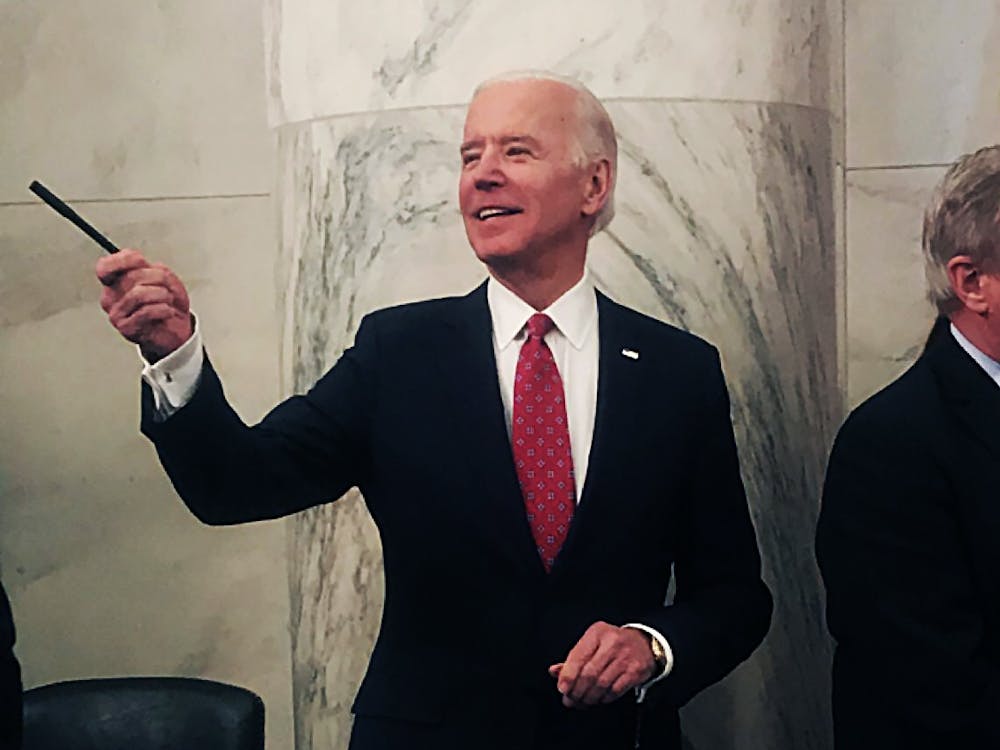Recent debate about President Joe Biden’s policies has focused on whether or not he should unilaterally cancel up to $50,000 of student debt via executive order. Proponents of this idea, such as Rep. Alexandria Ocasio-Cortez (D-NY) and Senate Majority Leader Chuck Schumer (D-NY), argue that it represents a needed economic stimulus and that it is something Biden can easily and quickly do by sidestepping Congress. The problem is that doing so would likely be unconstitutional, and would unwisely expand presidential powers further.
Long essays could be written on whether or not student debt relief is indeed an effective economic stimulus — since I am not an economist, or even an economics major, I will not wade into that debate. However, for the sake of argument, let’s just assume that it would be. Even then, for the President to issue that relief unilaterally by executive order would cause far more damage than its hypothetical benefits would be worth because it will certainly launch a divisive debate over the action’s constitutionality.
An executive order to cancel out federal student loan debt would work by ordering the Secretary of Education to release people from their debt under authority vaguely granted in the Higher Education Act of 1965. The problem is that there is absolutely no consensus that the President has the power to do this, and he will certainly be sued for doing so. Litigation over this issue would likely last years, delaying the relief for those who need it, and probably won’t succeed given the conservative nature of the Supreme Court. If Biden attempts to go down this path, knowing the futility that courts will never let his relief go through, he will waste an opportunity to accomplish a legitimate policy victory by other means.
More importantly, Biden issuing such an executive order this early in his presidency would be seen as a power-grab by many in Congress. The ability to unilaterally wipe out loans — a federal expenditure costing billions of dollars — is not given to the President in the Constitution. Rather, Biden would be seizing this power from Congress in a brazen attempt to expand his own executive power. This would be an action for which there is no constitutional basis — creating one now would be problematic, as it would provide precedent for future presidents to expand their executive power even further.
There has been a disturbing trend recently of presidents expanding their power through actions like these, in what has been termed by scholars as the imperial presidency. Even when done to accomplish effective policies — such as establishing DACA — executive actions bestow power on a president that cannot be taken away. That is power that can then be misused or directed to the national detriment, such as Executive Order 9066, which saw the mass internment of Japanese-Americans during World War II. Should President Biden invent the ability to unilaterally cancel billions of dollars in student debt, I worry what a future president with worse intentions would do with that newfound ability.
At a time when our democracy has been tested and strained like never before, it is more important than ever that President Biden refrain from expanding the imperial presidency. So many of the abuses of office that have arisen in recent years are a product of Americans permitting the president to expand the presidential power because it was convenient at the moment — that trend must now stop. We cannot reach a point where presidents are able to rule by decree — when that happens, we will have elected a dictator. Congress needs to have a stronger voice in this debate. They must affirm their ability to govern on behalf of the people they represent.
I know many progressives are frustrated with settling for policies that are not as bold, and perhaps less effective, when there are opportunities to go further — however, progress cannot be brought on at the expense of our democratic norms. I recognize that some will argue that now is the time for bold action, that people are suffering without this relief. This type of constitutional abuse will only antagonize Republicans at a time where we need political unity instead of the power-grabs that have become too common.
Fortunately, President Biden has a unique opportunity to reinvigorate the legislative process by working with a Congress that has hopefully seen the consequences of its excesses, following the storming of our nation’s Capitol last month. Now is the time for us to come together as Americans and do what we have always done — compromise. With a unified Democratic Congress, policies for student debt relief will be debated. While Congress may not choose to cancel $50,000 of debt for individuals, they can still make progress without further threatening our republic.
Matt Heller is an Opinion Columnist for the Cavalier Daily. He can be reached at opinion@cavalierdaily.com .
The views expressed in this column are not necessarily those of The Cavalier Daily. Columns represent the views of the authors alone.







